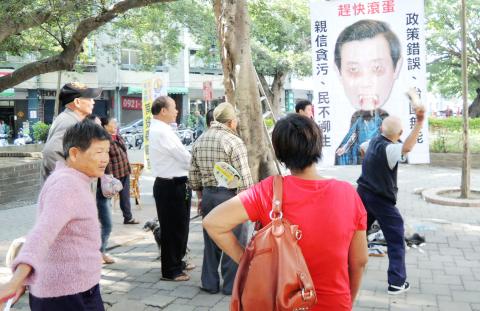The majority of Taiwanese favor increased cross-strait exchanges, but appear to be very cautious about a peace agreement between Taiwan and China, the results of a public opinion poll released yesterday showed.
Asked if they support the signing of a bilateral peace agreement, with President Ma Ying-jeou (馬英九) pledging “10 guarantees” in 2011, almost 70 percent of the respondents in a poll conducted by Taiwan Indicators Survey Research (TISR) said negotiations for such an accord should not begin before receiving authorization from a national referendum.
The poll found that 26.8 percent of respondents said negotiations should only begin after a referendum, 17.1 percent said the government should negotiate first and put the result to a referendum, and 41.5 percent said that both the beginning of negotiations and the results should be authorized by referendums.

Photo: Hsieh Chieh-yu, Taipei Times
“That means a total of 68.3 percent of those polled would grant a go-ahead to negotiations for a peace deal only after a national referendum,” TISR general manager Tai Li-an (戴立安) said in a press release.
Approximately the same percentage of respondents, 67.9 percent, opposed the notion that if a cross-strait peace pact was signed, unification with China should be recognized as a national goal, with 17.2 percent supportive and 15 percent declining to provide an answer.
In a question that allowed respondents to make multiple choices, most expressed support for increased bilateral exchanges, including mutual visits by officials of the Mainland Affairs Council and China’s Taiwan Affairs Office (60.2 percent), the establishment of representative offices on each other’s territory (57.5 percent) and shortening Chinese spouses’ waiting period for identification cards from six years to four (52.4 percent).
The support rate for trade pacts were lower, with 35.2 percent of those polled supporting a cross-strait trade in goods agreement and 31.8 percent supportive of the service trade pact, which was signed in June.
The respondents’ reaction to the order of priority between the service trade agreement and the trade in goods agreement, which is yet to be signed, appeared to be split, with 36.2 percent saying that the trade in goods pact could be signed before the current dispute over the service trade pact is settled, 42.7 percent opposing the proposal and 22.8 percent declining to answer.
The poll found Ma’s approval rating remained low at 14.3 percent, while his disapproval rating was 71.7 percent.
“A notable fact was that Ma’s disapproval rating was around 80 percent among respondents between 20 and 49 years old,” Tai said.
Premier Jiang Yi-huah’s (江宜樺) disapproval rating of 58.6 percent was the highest since he assumed the post in February, according to the poll.
The survey, conducted between Monday and Tuesday, collected 1,007 valid samples and had a margin of error of 3.1 percentage points.

ANOTHER EMERGES: The CWA yesterday said this year’s fourth storm of the typhoon season had formed in the South China Sea, but was not expected to affect Taiwan Tropical Storm Gaemi has intensified slightly as it heads toward Taiwan, where it is expected to affect the country in the coming days, the Central Weather Administration (CWA) said yesterday. As of 8am yesterday, the 120km-radius storm was 800km southeast of Oluanpi (鵝鑾鼻), Taiwan’s southernmost tip, moving at 9kph northwest, the agency said. A sea warning for Gaemi could be issued tonight at the earliest, it said, adding that the storm is projected to be closest to Taiwan on Wednesday or Thursday. Gaemi’s potential effect on Taiwan remains unclear, as that would depend on its direction, radius and intensity, forecasters said. Former Weather Forecast

As COVID-19 cases in Japan have been increasing for 10 consecutive weeks, people should get vaccinated before visiting the nation, the Centers for Disease Control (CDC) said. The centers reported 773 hospitalizations and 124 deaths related to COVID-19 in Taiwan last week. CDC Epidemic Intelligence Center Director Guo Hung-wei (郭宏偉) on Tuesday said the number of weekly COVID-19 cases reported in Japan has been increasing since mid-May and surpassed 55,000 cases from July 8 to July 14. The average number of COVID-19 patients at Japan’s healthcare facilities that week was also 1.39 times that of the week before and KP.3 is the dominant

The Chinese Communist Party’s (CCP) working group for Taiwan-related policies is likely to be upgraded to a committee-level body, a report commissioned by the Mainland Affairs Council (MAC) said. As Chinese President Xi Jinping (習近平) is increasingly likely to upgrade the CCP’s Central Leading Group for Taiwan Affairs, Taiwanese authorities should prepare by researching Xi and the CCP, the report said. At the third plenary session of the 20th Central Committee of the CCP, which ended on Thursday last week, the party set a target of 2029 for the completion of some tasks, meaning that Xi is likely preparing to

US-CHINA TRADE DISPUTE: Despite Beijing’s offer of preferential treatment, the lure of China has dimmed as Taiwanese and international investors move out Japan and the US have become the favored destinations for Taiwanese graduates as China’s attraction has waned over the years, the Ministry of Labor said. According to the ministry’s latest income and employment advisory published this month, 3,215 Taiwanese university graduates from the class of 2020 went to Japan, surpassing for the first time the 2,881 graduates who went to China. A total of 2,300 graduates from the class of 2021 went to the US, compared with the 2,262 who went to China, the document showed. The trend continued for the class of 2023, of whom 1,460 went to Japan, 1,334 went to